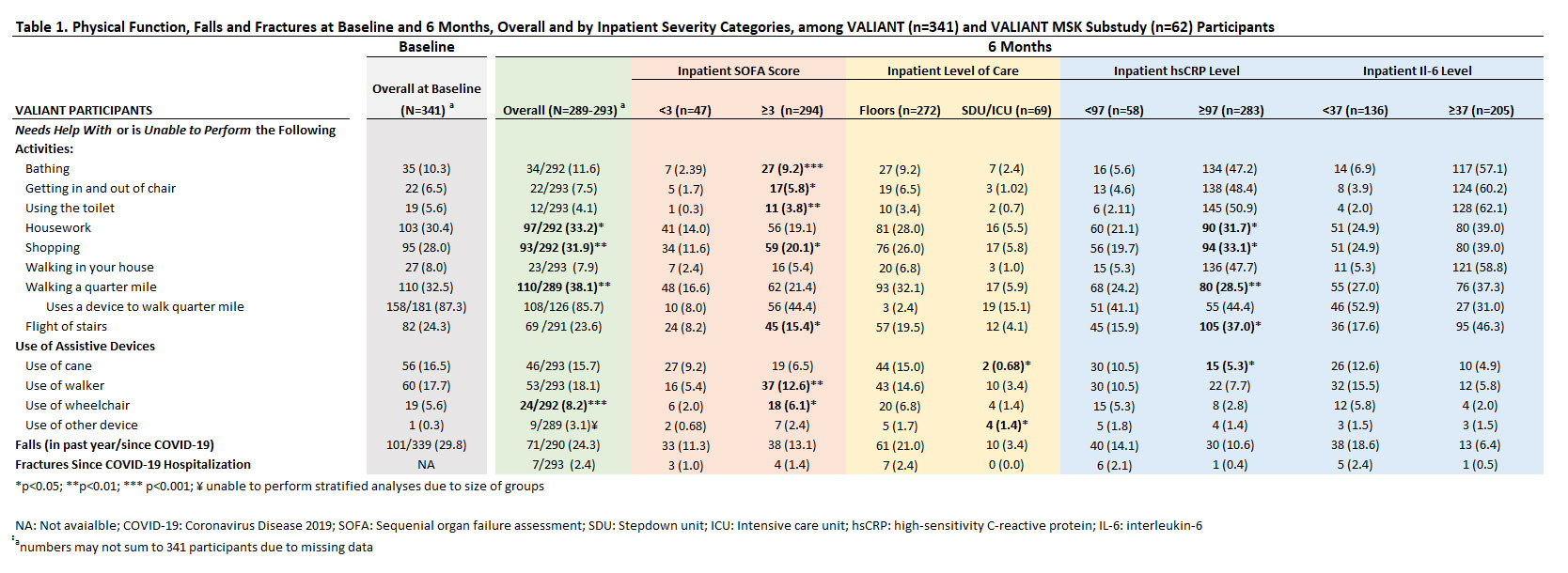Session Information
Date: Sunday, November 13, 2022
Title: Osteoporosis and Metabolic Bone Disease – Basic and Clinical Science Poster
Session Type: Poster Session C
Session Time: 1:00PM-3:00PM
Background/Purpose: No longitudinal studies have examined the impact of COVID-19 or COVID-19 severity on physical function and disability outcomes among older adults. Multiple factors, including illness- and rehabilitation-related factors, can create a perfect storm for prolonged disability, and increased falls and fractures in this population. We evaluated the association between baseline severity of COVID-19 with outcomes at 6 months, including physical function, incident falls and fracture in a longitudinal virtual cohort of older patients.
Methods: The VALIANT (COVID-19 in Older Adults: A Longitudinal Assessment) study is a prospective observational cohort study that enrolled patients ≥60 years hospitalized for COVID-19 across the Yale-New Haven Health System from 7/2020-6/2021. Participants completed telephone survey interviews at baseline, and 1-, 3- and 6-months following hospital discharge. The survey included questions regarding sociodemographic characteristics, baseline health status, COVID-19 related factors, physical function, mobility, and falls/fractures. Stratified analyses by COVID-19 severity were performed based upon: Sequential Organ Failure Assessment (SOFA) score (range 0-24, ≥3 associated with increased COVID severity), level of care received, and inflammatory marker levels during hospitalization (hsCRP and IL-6).
Results: We enrolled 341 participants (49% women, 72.5% White), with a median age of 70 (IQR 12) years. The proportion of patients reporting impairments with 8 different physical function domains at baseline and 6 months is shown in Table 1. At 6 months, we found a higher proportion of patients unable to independently do housework (33.2% vs 30.4%, p= 0.013), shop (31.9% vs 28.0%, p=0.002) and walk a quarter mile (38.1% vs 32.5%, p=0.008). When physical function at 6 months was stratified by COVID-19 severity, we found a higher proportion of patients with a high SOFA score (≥3 vs. < 3) reported being unable to independently bathe (9.2% vs 2.4%, p< 0.001), get in and out of a chair (5.8% vs 1.7%, p=0.017), use the toilet (3.8% vs 0.3%, p=0.006), shop (20.1% vs 11.6%, p=0.011), or walk flight of stairs (15.4% vs 8.2%, p=0.016). A significantly higher proportion of patients with high inpatient hsCRP levels (≥97 mg/L) were unable to independently do housework (31.7% vs 21.1%, p= 0.013), shop (33.1% vs 19.7%, p=0.043), walk a quarter mile (28.5% vs 24.2%, p=0.009) and walk a flight of stairs (37.0% vs 15.9%. p= 0.0114). Thirty percent (101/339) of participants reported a fall in the past year before COVID-19, while 24.3% participants reported a fall in the 6 months since COVID-19 hospitalization. There were no significant differences in incident falls when categorized by COVID severity. Seven participants reported having a fracture following hospitalization.
Conclusion: In this study, a greater proportion of older adults with severe COVID-19 reported impairments in multiple domains related to physical function and disability at 6 months post-hospitalization. Proactive strategies emphasizing rehabilitation and functional recovery are critically important for older adults hospitalized with COVID-19, particularly those with severe disease.
To cite this abstract in AMA style:
Wong C, Cabrera D, Geda M, Cohen A, Ferrante L, Hajduk A, Hsieh E. Impact of COVID-19 Severity on Physical Function, Mobility, Falls and Fractures Among Older Patients After Hospitalization: A Longitudinal Study [abstract]. Arthritis Rheumatol. 2022; 74 (suppl 9). https://acrabstracts.org/abstract/impact-of-covid-19-severity-on-physical-function-mobility-falls-and-fractures-among-older-patients-after-hospitalization-a-longitudinal-study/. Accessed .« Back to ACR Convergence 2022
ACR Meeting Abstracts - https://acrabstracts.org/abstract/impact-of-covid-19-severity-on-physical-function-mobility-falls-and-fractures-among-older-patients-after-hospitalization-a-longitudinal-study/

